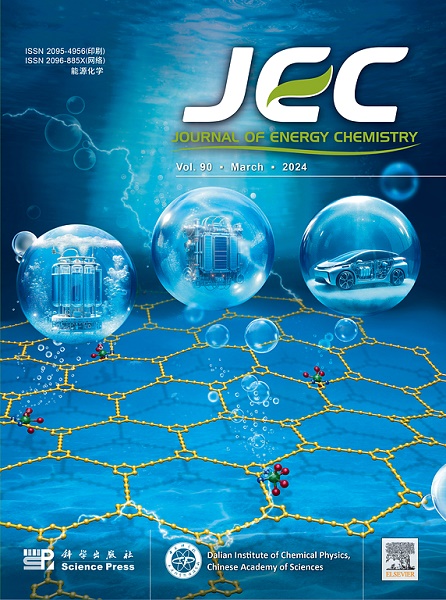Facile scalable fabrication of triazine-based flexible covalent organic framework fiber film with multifunction at room temperature
IF 13.1
1区 化学
Q1 Energy
引用次数: 0
Abstract
Flexible covalent organic framework (COF) film has drawn much attention as a promising functional material due to their unique molecular structure and self-supporting property. However, the traditional solvothermal method of synthesizing flexible COF film is usually complicated, long-term duration and energy-consuming, making it unsuitable for scalable preparation. To address these limitations, a new method combining electrospinning and sacrificial template is proposed to quickly produce triazine-based COF fiber films at room temperature. The method is easy to operate and has a short reaction time (minimum 0.5 h) without dehydration and deoxygenation processes at room temperature, making it suitable for large-scale production (20 cm × 30 cm). Different from the unprocessable of COF powder, COF films not only have good flexibility and mechanical properties, but also can be patterned with multiple functions to adapt to various application scenarios. Moreover, the functionality of triazine-structured COF is retained, enabling the use of the films in energy conversion and storage applications. Triazine-based COFs naturally have scalable conjugated structure, thus showing potential photocatalytic probability. Furthermore, the large pore structure of COF films enables loading of phase change materials endowing comprehensive properties of thermal management and flame retardance. This study proposes a strategy for the rapid synthesis of COF fiber films at room temperature and paves the way for multifunctional and high-performance COF based materials.
三嗪基多功能柔性共价有机骨架纤维薄膜的室温可伸缩制备
柔性共价有机骨架(COF)薄膜由于其独特的分子结构和自支撑性能而成为一种很有前途的功能材料。然而,传统的溶剂热法合成柔性COF薄膜的工艺复杂、耗时长、耗能大,不适合规模化制备。针对这些局限性,提出了一种结合静电纺丝和牺牲模板的室温快速制备三嗪基COF纤维薄膜的新方法。该方法操作简便,室温下反应时间短(最低0.5 h),无需脱水和脱氧过程,适合大规模生产(20 cm × 30 cm)。不同于COF粉末的不可加工性,COF薄膜不仅具有良好的柔韧性和力学性能,而且可以进行多种功能的图案化,以适应各种应用场景。此外,保留了三嗪结构COF的功能,使薄膜能够用于能量转换和存储应用。三嗪基COFs天然具有可伸缩的共轭结构,因此具有潜在的光催化可能性。此外,COF薄膜的大孔结构使相变材料的加载具有热管理和阻燃的综合性能。本研究提出了室温下快速合成COF纤维薄膜的策略,为开发多功能高性能的COF基材料铺平了道路。
本文章由计算机程序翻译,如有差异,请以英文原文为准。
求助全文
约1分钟内获得全文
求助全文
来源期刊

Journal of Energy Chemistry
CHEMISTRY, APPLIED-CHEMISTRY, PHYSICAL
CiteScore
19.10
自引率
8.40%
发文量
3631
审稿时长
15 days
期刊介绍:
The Journal of Energy Chemistry, the official publication of Science Press and the Dalian Institute of Chemical Physics, Chinese Academy of Sciences, serves as a platform for reporting creative research and innovative applications in energy chemistry. It mainly reports on creative researches and innovative applications of chemical conversions of fossil energy, carbon dioxide, electrochemical energy and hydrogen energy, as well as the conversions of biomass and solar energy related with chemical issues to promote academic exchanges in the field of energy chemistry and to accelerate the exploration, research and development of energy science and technologies.
This journal focuses on original research papers covering various topics within energy chemistry worldwide, including:
Optimized utilization of fossil energy
Hydrogen energy
Conversion and storage of electrochemical energy
Capture, storage, and chemical conversion of carbon dioxide
Materials and nanotechnologies for energy conversion and storage
Chemistry in biomass conversion
Chemistry in the utilization of solar energy
 求助内容:
求助内容: 应助结果提醒方式:
应助结果提醒方式:


